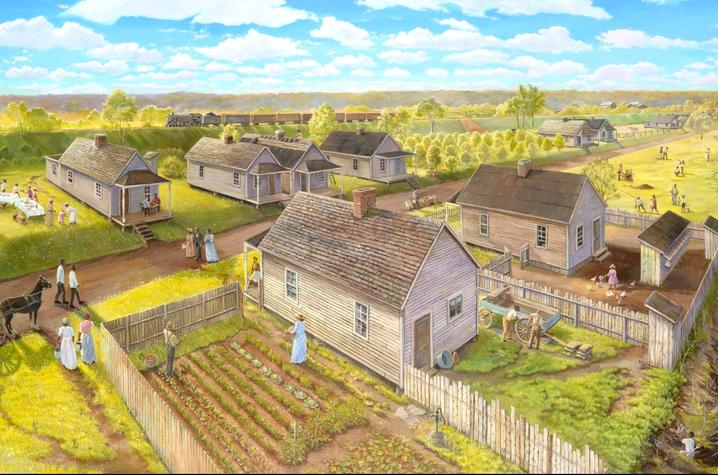
Innovative efforts to preserve a historic Lexington neighborhood have earned the Kentucky Archaeological Survey and the Davis Bottom History Preservation Project a top honor in the field of a archaeology.
They have been named the 2018 recipients of the Society for American Archaeology (SAA) Award for Excellence in Public Education. The award is designed to recognize and encourage outstanding achievements by individuals or institutions in the sharing of archaeological knowledge with the public.
Davis Bottom was a residential community located west of downtown Lexington. Established for free blacks after the Civil War, Davis Bottom was home to several generations of African-American, European and Appalachian families who moved to the area in search of jobs and education. In 2010, the neighborhood was impacted by the construction of a new road — the Newtown Pike Extension. The project is a collaborative effort between scholars, educators and residents to document the history of this tight-knit community.
Gwynn Henderson, education coordinator at the Kentucky Archaeological Survey and adjunct assistant professor in the Department of Anthropology, is one of several UK employees who embarked on a mission to ensure the Davis Bottom neighborhood would not be forgotten.
"All of us involved in the Davis Bottom History Preservation Project look forward to a time when the project’s website is used routinely by teachers all over the United States and the world," Henderson said. "The Davis Bottom History Preservation Project takes seriously public archaeologists’ responsibility to share with American citizens the results of the archaeological research we do."
Components of the Davis Bottom History Preservation Project were developed by archaeologists and educators with the Kentucky Archaeological Survey (KAS) and the Department of Anthropology in cooperation with the Kentucky Heritage Council. Funding for the development of the webpage, lesson plans and artwork was provided by the Kentucky Transportation Cabinet and the Federal Highway Administration as part of the Newtown Pike Extension Project. Additional funding was provided by the Nashville District, Army Corps of Engineers.
The full Davis Bottom History Preservation Project features several integrated components:
- An hour-long public television documentary titled "Davis Bottom: Rare History, Valuable Lives";
- its companion website, the Davis Bottom History Preservation Project Website;
- "Teaching Through Documentary Art: Lessons for Elementary and Middle School Social Studies Teachers," a series of humanities and social studies lessons linked to two murals commissioned for the documentary;
- "Investigating A Shotgun House," Case Study 12 in the "Project Archaeology: Investigating Shelter" curriculum, a national science and social studies unit for grades three through five; and
- the Davis Bottom Digital Media Archive.
Mimi Becker taught the curriculum to students in her seventh-grade history class at Burgin Independent School in Burgin, Kentucky.
"'Investigating A Shotgun House' offered excellent material by using the processes of archaeological study to understand the culture of Davis Bottom," Becker said. "However, the most rewarding and effective outcomes were the appreciation the students gained for the significance of the actual people in the neighborhood. They would even get their parents to drive to the area when in Lexington. Students recognized from their studies that something special had existed there."
The project employed several fields of study with one goal in mind, to bring the compelling story of one of Kentucky’s first integrated communities to millions of teachers and students through a variety of educational mediums.
"They have produced an outstanding body of work on Davis Bottom. This award recognizes the long-term service to the discipline by the Kentucky Archaeological Survey and their contributions to the field of public archaeology. Their work and dedication to advocacy and education is an admirable model for all archaeologists and organizations to follow," said the Award for Excellence in Public Education Committee.
The award will be presented at the 83rd Annual SAA meeting in Washington, D.C., on Friday, April 13.
